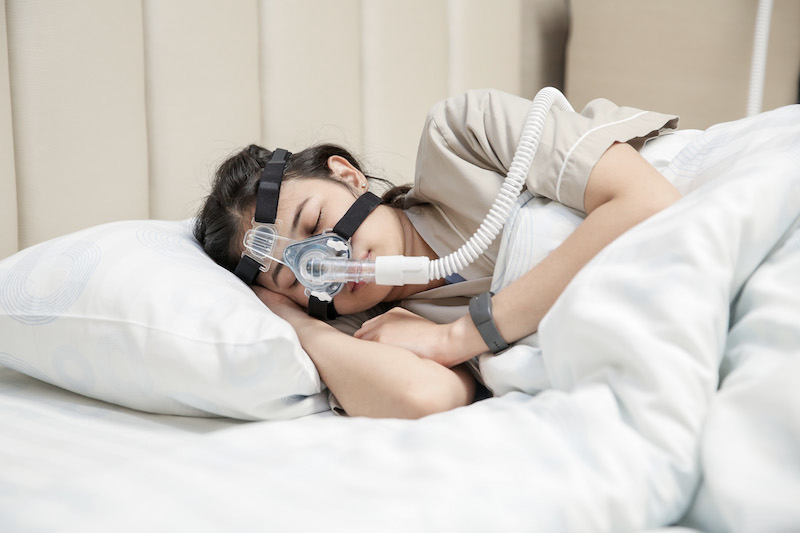Who would believe that snoring could be life-threatening, especially the condition of sleep apnea found in every gender and age, and is more common in men, obese people, those who have undergone nasal, facial, or chin reduction surgery, including women who take or inject male hormones, androgens. Risk factors may cause the airway to collapse during sleep, leading to chronic diseases over time. Therefore, it is not surprising that patients with sleep apnea problems are more likely to have high blood pressure, heart disease, high blood cholesterol, diabetes, acid reflux, and an increased risk of stroke.
The origin of snoring
Normally, breathing does not make a sound, but if breathing makes a sound, the problem may come from the nasal passages being narrow like when having a cold or from the throat, known as ‘snoring,’ which is caused by “constriction of the throat” because the throat has an epiglottis. When breathing, the epiglottis will flap and become a snoring sound, so it is not a normal condition for most people. The cause of snoring should be identified. If there are abnormal symptoms, such as apnea, low blood oxygen, leading to the brain waking up, restless sleep, fatigue, it indicates that the snoring affects sleep quality and should be treated.
Sleep disorders
Factors that cause abnormal sleep include:
- Drinking alcohol: Group who snore due to drinking alcohol before sleep for 3 hours will have the effect of making the respiratory muscles more collapsed. If there are no problems with drowsiness, fatigue, or cognitive impairment, treatment may not be necessary, but symptoms should be monitored periodically.
- Facial structure: Group with abnormal congenital facial structure or those who have undergone surgery to reduce the size of the nose, face, chin may have the chance of snoring and sleep apnea because the anatomy changes from the original, making the nasal, oral, and throat passages smaller.
- Sex: Statistics show that men have more sleep disorders than women because the androgen hormone makes the ability of men’s airways to maintain their condition less than women. This results in men having a higher chance of sleep apnea than women. Women’s higher tolerability leads to less pronounced abnormal symptoms but may have minor symptoms such as restless sleep, increased forgetfulness, fatigue, and depression, but still able to perform various activities. Therefore, gender is another factor that affects abnormal sleep, or even in cases where women have higher androgen hormones, they are more likely to have sleep apnea conditions.
- Age: Comparing between younger and older people, those aged 65 and over will find that the percentage of sleep apnea increases with age.
- Obesity: Increased fat accumulation, both inside the throat and around the neck, causing pressure on the airway during sleep.
- Genetics: Such as facial structure, some people have smaller chins or receding chins, reducing the width of the mouth. The chance of the tongue dropping back during sleep makes it more likely to obstruct the airway. Or some people have genetic abnormalities unrelated to chromosomes.

The impact from sleep apnea
Frequent sleep apnea makes the brain stay alert, causing restless sleep. The ability to sleep deeply and dream decreases, which relates to the body’s performance because shallow sleep is just rest like napping during the day, only refreshing but deep sleep affects the repair of worn parts of the body and is involved in memory from short-term to long-term only in deep sleep, related to learning. The dreaming phase relates to skill memory, such as how to drive, how to play sports, but in the case of high IQ people, they may not feel much because they have more capital than average people. Additionally, long-term impacts from sleep apnea can lead to high blood pressure, heart disease, high blood cholesterol, diabetes, acid reflux, and an increased risk of stroke.
Sleep examination
Sleep Lab can help differentiate whether a patient has normal snoring or obstructive sleep apnea. It can indicate the severity of the disease, how severe the sleep apnea condition is, and help doctors plan better treatment for patients.
Sleep treatment
Treatment methods when having sleep problems include taking medication, using respiratory aids, which vary from person to person, or undergoing surgery, such as in the case of children with large tonsils in the throat blocking and leading to sleep apnea. If surgery is performed, there is a chance of recovery unless that person has abnormal excessive muscle collapse of the airway or in cases of significant overweight, weight loss may alleviate the symptoms.
